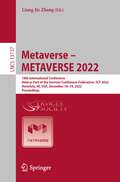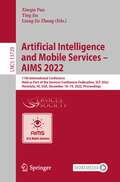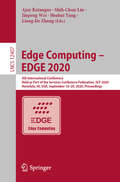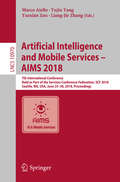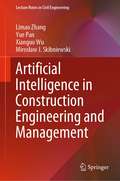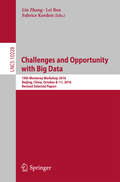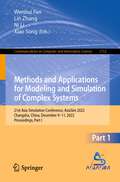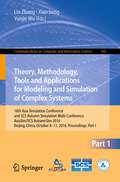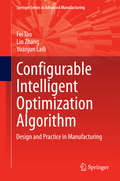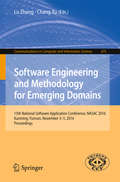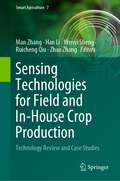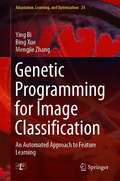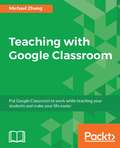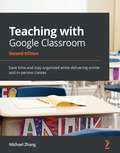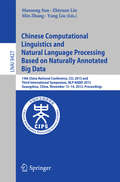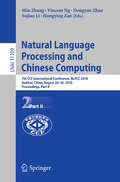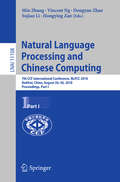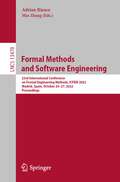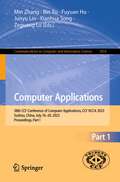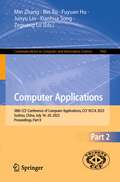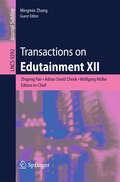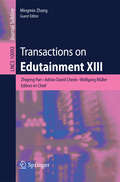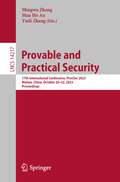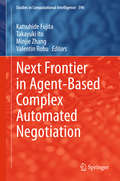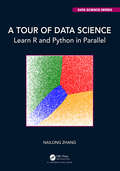- Table View
- List View
Metaverse – METAVERSE 2022: 18th International Conference, Held as Part of the Services Conference Federation, SCF 2022, Honolulu, HI, USA, December 10–14, 2022, Proceedings (Lecture Notes in Computer Science #13737)
by Liang-Jie ZhangThis book constitutes the refereed proceedings of the 18th METAVERSE 2022 conference, held as part of the Services Conference Federation, SCF 2022, in December 2022 in Honolulu, USA. The 7 full papers and 3 short papers presented were carefully reviewed and selected from 21 submissions. The papers cover topics in the field of Advertising Services, Banking Services, Broadcasting & Cable TV Service, Business Services, Communications Services, Government Services, Real Estate Operations Services, Schools and Education Services, Healthcare Services, and much more.
Artificial Intelligence and Mobile Services – AIMS 2022: 11th International Conference, Held as Part of the Services Conference Federation, SCF 2022, Honolulu, HI, USA, December 10–14, 2022, Proceedings (Lecture Notes in Computer Science #13729)
by Liang-Jie Zhang Xiuqin Pan Ting JinThis book constitutes the proceedings of the 11th International Conference on Artificial Intelligence and Mobile Services, AIMS 2022, held as Part of the Services Conference Federation, SCF 2022, held in Honolulu, HI, USA, in December 2022. The 10 full papers presented in this volume were carefully reviewed and selected from 22 submissions.The International Conference on AI & Mobile Services (AIMS 2022) aims at providing an international forum that is dedicated to exploring different aspects of AI (from technologies to approaches and algorithms) and mobile services (from business management to computing systems, algorithms, and applications) to promoting technological innovations in research and development of mobile services, including, but not limited to, wireless & sensor networks, mobile & wearable computing, mobile enterprise & eCommerce, ubiquitous collaborative & social services, machine-to-machine & Internet-of-things clouds, cyber-physical integration, and big data analytics for mobility-enabled services.
Edge Computing – EDGE 2020: 4th International Conference, Held as Part of the Services Conference Federation, SCF 2020, Honolulu, HI, USA, September 18-20, 2020, Proceedings (Lecture Notes in Computer Science #12407)
by Liang-Jie Zhang Jinpeng Wei Ajay Katangur Shih-Chun Lin Shuhui YangThis book constitutes the proceedings of the International Conference on Edge Computing, EDGE 2020, held virtually as part of SCF 2020, in Honolulu, HI, USA, in September 2020. The 7 full and 2 short papers presented in this volume were carefully reviewed and selected from 13 submissions.The conference proceeding EDGE 2020 presents the latest fundamental advances in the state of the art and practice of edge computing, identify emerging research topics, and define the future of edge computing.
Artificial Intelligence and Mobile Services – AIMS 2018: 7th International Conference, Held as Part of the Services Conference Federation, SCF 2018, Seattle, WA, USA, June 25-30, 2018, Proceedings (Lecture Notes in Computer Science #10970)
by Liang-Jie Zhang Yuexian Zou Yujiu Yang Marco AielloThis book constitutes the proceedings of the International Conference on Artificial Intelligence and Mobile Services, AIMS 2018, held as part of SCF 2018, in Seattle, WA, USA, in June 2018. The 20 papers presented in this volume were carefully reviewed and selected from numerous submissions. The papers cover different aspects of mobile services from business management to computing systems, algorithms and applications. They promote technological technological innovations in research and development of mobile services, including, but not limited to, wireless and sensor networks, mobile and wearable computing, mobile enterprise and eCommerce, ubiquitous collaborative and social services, machine-to-machine and Internet-of-things, clouds, cyber-physical integration, and big data analytics for mobility-enabled services
Artificial Intelligence in Construction Engineering and Management (Lecture Notes in Civil Engineering #163)
by Limao Zhang Yue Pan Xianguo Wu Mirosław J. SkibniewskiThis book highlights the latest technologies and applications of Artificial Intelligence (AI) in the domain of construction engineering and management. The construction industry worldwide has been a late bloomer to adopting digital technology, where construction projects are predominantly managed with a heavy reliance on the knowledge and experience of construction professionals. AI works by combining large amounts of data with fast, iterative processing, and intelligent algorithms (e.g., neural networks, process mining, and deep learning), allowing the computer to learn automatically from patterns or features in the data. It provides a wide range of solutions to address many challenging construction problems, such as knowledge discovery, risk estimates, root cause analysis, damage assessment and prediction, and defect detection. A tremendous transformation has taken place in the past years with the emerging applications of AI. This enables industrial participants to operate projects more efficiently and safely, not only increasing the automation and productivity in construction but also enhancing the competitiveness globally.
Challenges and Opportunity with Big Data: 19th Monterey Workshop 2016, Beijing, China, October 8 – 11, 2016, Revised Selected Papers (Lecture Notes in Computer Science #10228)
by Lin Zhang Fabrice Kordon Lei RenThis book presents the thoroughly refereed and revised post-workshop proceedings of the 19th Monterey Workshop, held in Beijing, China, in Ocotber 2016. The workshop explored the challenges associated with the Development, Operation and Management of Large-Scale complex IT Systems. The 18 revised full papers presented were significantly extended and improved by the insights gained from the productive and lively discussions at the workshop, and the feedback from the post-workshop peer reviews. 2016 marks the 23rd anniversary for the Monterey Workshop series which started in 1993. For nearly a quarter of century, the Monterey Workshops have established themselves as an important international forum to foster, among academia, industry, and government agencies, discussion and exchange of ideas, research results and experience in developing software intensive systems, and have significantly advanced the field. The community of the workshop participants has grown to become an influential source of ideas and innovations and its impact on the knowledge economy has been felt worldwide.
Methods and Applications for Modeling and Simulation of Complex Systems: 21st Asia Simulation Conference, AsiaSim 2022, Changsha, China, December 9-11, 2022, Proceedings, Part I (Communications in Computer and Information Science #1712)
by Lin Zhang Xiao Song Wenhui Fan Ni LiThe two-volume set CCIS 1712 and 1713 constitutes the proceedings of the 21st Asian Simulation Conference, AsiaSim 2022, which took place in Changsha, China, in January 2023. Due to the Covid pandemic AsiaSim 2022 has been postponed to January 2023. The 97 papers presented in the proceedings were carefully reviewed and selected from 218 submissions. The contributions were organized in topical sections as follows: Modeling theory and methodology; Continuous system/discrete event system/hybrid system/intelligent system modeling and simulation; Complex systems and open, complex and giant systems modeling and simulation; Integrated natural environment and virtual reality environment modeling and simulation; Networked Modeling and Simulation; Flight simulation, simulator, simulation support environment, simulation standard and simulation system construction; High performance computing, parallel computing, pervasive computing, embedded computing and simulation; CAD/CAE/CAM/CIMS/VP/VM/VR/SBA; Big data challenges and requirements for simulation and knowledge services of big data ecosystem; Artificial intelligence for simulation; Application of modeling/simulation in science/engineering/society/economy /management/energy/transportation/life/biology/medicine etc; Application of modeling/simulation in energy saving/emission reduction, public safety, disaster prevention/mitigation; Modeling/simulation applications in the military field; Modeling/simulation applications in education and training; Modeling/simulation applications in entertainment and sports.
Theory, Methodology, Tools and Applications for Modeling and Simulation of Complex Systems: 16th Asia Simulation Conference and SCS Autumn Simulation Multi-Conference, AsiaSim/SCS AutumnSim 2016, Beijing, China, October 8-11, 2016, Proceedings, Part I (Communications in Computer and Information Science #643)
by Lin Zhang Xiao Song Yunjie WuThis four-volume set (CCIS 643, 644, 645, 646) constitutes the refereed proceedings of the 16th Asia Simulation Conference and the First Autumn Simulation Multi-Conference, AsiaSim / SCS AutumnSim 2016, held in Beijing, China, in October 2016. The 265 revised full papers presented were carefully reviewed and selected from 651 submissions. The papers in this first volume of the set are organized in topical sections on modeling and simulation theory and methodology; model engineering for system of systems; high performance computing and simulation; modeling and simulation for smart city.
Configurable Intelligent Optimization Algorithm: Design and Practice in Manufacturing (Springer Series in Advanced Manufacturing)
by Lin Zhang Fei Tao Yuanjun LailiPresenting the concept and design and implementation of configurable intelligent optimization algorithms in manufacturing systems, this book provides a new configuration method to optimize manufacturing processes. It provides a comprehensive elaboration of basic intelligent optimization algorithms, and demonstrates how their improvement, hybridization and parallelization can be applied to manufacturing. Furthermore, various applications of these intelligent optimization algorithms are exemplified in detail, chapter by chapter. The intelligent optimization algorithm is not just a single algorithm; instead it is a general advanced optimization mechanism which is highly scalable with robustness and randomness. Therefore, this book demonstrates the flexibility of these algorithms, as well as their robustness and reusability in order to solve mass complicated problems in manufacturing. Since the genetic algorithm was presented decades ago, a large number of intelligent optimization algorithms and their improvements have been developed. However, little work has been done to extend their applications and verify their competence in solving complicated problems in manufacturing. This book will provide an invaluable resource to students, researchers, consultants and industry professionals interested in engineering optimization. It will also be particularly useful to three groups of readers: algorithm beginners, optimization engineers and senior algorithm designers. It offers a detailed description of intelligent optimization algorithms to algorithm beginners; recommends new configurable design methods for optimization engineers, and provides future trends and challenges of the new configuration mechanism to senior algorithm designers.
Software Engineering and Methodology for Emerging Domains
by Lu Zhang Chang XuThis book constitutes the thoroughly refereed proceedings of the 15th National Software Application Conference, NASAC 2016, held in Kunming, Yunnan, in November 2016. The 15 revised selected papers were selected from 38 submissions and focus on all aspects of software engineering, e. g. requirements engineering, software methodologies, software analytics, software testing and evolution, and empirical studies.
Sensing Technologies for Field and In-House Crop Production: Technology Review and Case Studies (Smart Agriculture #7)
by Man Zhang Han Li Wenyi Sheng Ruicheng Qiu Zhao ZhangThis book focuses on state-of-the-art sensing and automation technologies for field crops and in-house product production and provides a lot of innovative knowledge on image processing, AI algorithms and applications in agriculture, and robotics. This book provides undergraduate or graduate students with take-away knowledge for unmanned agricultural production, including but not limited to corn disease detection, wheat head detection and counting, and soil nutrient condition monitoring. The first three chapters focus on reviewing plant phenotyping sensing technology and robotics and soil nutrient monitoring, followed by in-house crop sensing robotics. Then two case studies on corn and the other two case studies on wheat are presented.
Genetic Programming for Image Classification: An Automated Approach to Feature Learning (Adaptation, Learning, and Optimization #24)
by Mengjie Zhang Ying Bi Bing XueThis book offers several new GP approaches to feature learning for image classification. Image classification is an important task in computer vision and machine learning with a wide range of applications. Feature learning is a fundamental step in image classification, but it is difficult due to the high variations of images. Genetic Programming (GP) is an evolutionary computation technique that can automatically evolve computer programs to solve any given problem. This is an important research field of GP and image classification. No book has been published in this field. This book shows how different techniques, e.g., image operators, ensembles, and surrogate, are proposed and employed to improve the accuracy and/or computational efficiency of GP for image classification. The proposed methods are applied to many different image classification tasks, and the effectiveness and interpretability of the learned models will be demonstrated. This book is suitable as a graduate and postgraduate level textbook in artificial intelligence, machine learning, computer vision, and evolutionary computation.
Teaching with Google Classroom
by Michael ZhangPut Google Classroom to work while teaching your students and make your life easier About This Book * This is the first book to guide educators step by step through teaching with Google Classroom * It's focused on you, your students, and providing great learning experiences easily * It's easy to follow, with everything you need to get started and keep going even if you're not a technology fan Who This Book Is For This is a book for educators who want to use Google Classroom to teach better. It's not for geeks. There are rich examples, clear instructions, and enlightening explanations to help you put this platform to work. What You Will Learn * Create a Google Classroom and add customized information for each individual class * Add students to a Google Classroom * Send announcements and questions to students * Create, distribute, collect, and grade assignments through Google Classroom * Add events to and share a Google Classroom's calendar with parents to track a student's progress * Reuse posts, archive classrooms, and perform other administrative tasks in Google Classroom * Use Google Docs Add-ons, and Google Chrome Webstore Apps and Extensions to enhance assignments * Set up Google Classroom's mobile app In Detail Google Classroom helps teachers bring their work online. According to Google Trends, it's already bigger than Moodle after barely a year in the wild. This book is a complete start-to-finish guide for teachers using Google Classroom for the first time. It explains what Google Classroom is, what it can do, how to set it up, and how to use it to enhance student learning while making your life as a teacher easier. It shows you how to place resources and activities online, gather assignments, and develop group and individual activities. It's not just a manual, you'll also discover inspiring, easy ways to put Google Classroom to work for you and your class. Style and approach This is a step-by-step guide to using Google Classroom, the rapidly emerging platform for education, effectively.
Teaching with Google Classroom: Save time and stay organized while delivering online and in-person classes, 2nd Edition
by Michael ZhangBuild interactive courses for online learning using Google's learning management solutionKey FeaturesDiscover best practices for developing a creative educational experience using the features of Google ClassroomGet to grips with the modern features of Google Classroom that can help you meet the demands of online teachingCreate online courses and deliver classes in an interactive mannerBook DescriptionGoogle Classroom is designed to help you manage and deliver online and in-person courses in an interactive manner. Using Google Classroom saves time organizing and communicating information to students and parents. This updated second edition of Teaching with Google Classroom covers the modern features of Google Classroom that meet the current needs of online teaching. The book is written from the high-school perspective but is applicable to teachers and educators of all age groups. If you're new to Google Classroom or an experienced user who wants to explore more advanced methods with Google Classroom, this book is for you. With hands-on tutorials, projects, and self-assessment questions, you'll learn how to create classes, add students to those classes, send announcements, and assign classwork. The book also demonstrates how to start an online discussion with your students. Later, you'll discover how you can involve parents by inviting them to receive guardian emails and sharing Google Calendar with a URL. This will help them to view assignment deadlines and other important information. The book goes step by step through all the features available and examples of how best to use them to manage your classroom. By the end of this book, you'll be able to do more with Google Classroom, managing your online or in-person school classes effectively.What you will learnCreate a classroom and add customized information for each individual classSend announcements and questions to studentsCreate, distribute, collect, and grade assignments through Google ClassroomLink student accounts to guardian emails for daily or weekly updatesUse Google Forms to create quizzes that automatically grade and return results to studentsReuse posts, archive classrooms, and perform other administrative tasks in Google ClassroomHost online sessions with students and set up Google Classroom's mobile appWho this book is forThis Google Classroom book is written by an educator, for educators. It's for anyone who wants to teach effectively with Google Classroom. There are rich examples, clear instructions, and enlightening explanations to help you put this platform to work.
Chinese Computational Linguistics and Natural Language Processing Based on Naturally Annotated Big Data: 14th China National Conference, CCL 2015 and Third International Symposium, NLP-NABD 2015, Guangzhou, China, November 13-14, 2015, Proceedings (Lecture Notes in Computer Science #9427)
by Min Zhang Yang Liu Maosong Sun Zhiyuan LiuThis book constitutes the refereed proceedings of the 14th China National Conference on Computational Linguistics, CCL 2014, and of the Third International Symposium on Natural Language Processing Based on Naturally Annotated Big Data, NLP-NABD 2015, held in Guangzhou, China, in November 2015. The 34 papers presented were carefully reviewed and selected from 283 submissions. The papers are organized in topical sections on lexical semantics and ontologies; semantics; sentiment analysis, opinion mining and text classification; machine translation; multilinguality in NLP; machine learning methods for NLP; knowledge graph and information extraction; discourse, coreference and pragmatics; information retrieval and question answering; social computing; NLP applications.
Natural Language Processing and Chinese Computing: 7th CCF International Conference, NLPCC 2018, Hohhot, China, August 26–30, 2018, Proceedings, Part II (Lecture Notes in Computer Science #11109)
by Min Zhang Vincent Ng Dongyan Zhao Sujian Li Hongying ZanThis two volume set of LNAI 11108 and LNAI 11109 constitutes the refereed proceedings of the 7th CCF Conference on Natural Language Processing and Chinese Computing, NLPCC 2018, held in Hohhot, China, in August 2018. The 55 full papers and 31 short papers presented were carefully reviewed and selected from 308 submissions. The papers of the first volume are organized in the following topics: conversational Bot/QA/IR; knowledge graph/IE; machine learning for NLP; machine translation; and NLP applications. The papers of the second volume are organized as follows: NLP for social network; NLP fundamentals; text mining; and short papers.
Natural Language Processing and Chinese Computing: 7th CCF International Conference, NLPCC 2018, Hohhot, China, August 26–30, 2018, Proceedings, Part I (Lecture Notes in Computer Science #11108)
by Min Zhang Vincent Ng Dongyan Zhao Sujian Li Hongying ZanThis two volume set of LNAI 11108 and LNAI 11109 constitutes the refereed proceedings of the 7th CCF Conference on Natural Language Processing and Chinese Computing, NLPCC 2018, held in Hohhot, China, in August 2018. The 55 full papers and 31 short papers presented were carefully reviewed and selected from 308 submissions. The papers of the first volume are organized in the following topics: conversational Bot/QA/IR; knowledge graph/IE; machine learning for NLP; machine translation; and NLP applications. The papers of the second volume are organized as follows: NLP for social network; NLP fundamentals; text mining; and short papers.
Formal Methods and Software Engineering: 23rd International Conference on Formal Engineering Methods, ICFEM 2022, Madrid, Spain, October 24–27, 2022, Proceedings (Lecture Notes in Computer Science #13478)
by Min Zhang Adrian RiescoThis book constitutes the proceedings of the 23rd International Conference on Formal Engineering Methods, ICFEM 2022, held in Madrid, Spain, in October 2022. The 16 full and 4 short papers presented together with 1 doctoral symposium paper in this volume were carefully reviewed and selected from 41 submissions. The papers cover for research in all areas related to formal engineering methods, such as verification and validation, software engineering, formal specification and modeling, software security, and software reliability.
Computer Applications: 38th CCF Conference of Computer Applications, CCF NCCA 2023, Suzhou, China, July 16–20, 2023, Proceedings, Part I (Communications in Computer and Information Science #1959)
by Min Zhang Bin Xu Fuyuan Hu Junyu Lin Xianhua Song Zeguang LuThe two-volume set CCIS 1959 and 1960 constitutes the refereed post-conference proceedings of the 38th CCF National Conference on Computer Applications, CCF NCCA 2023, held in Suzhou, China, during July 16–20, 2023.The 39 revised full papers presented in these proceedings were carefully reviewed and selected from 197 submissions. The papers are organized in the following topical sections:Volume I:Artificial intelligence and application.Volume II:Data science and technology; pattern recognition and machine learning; network communication and security; frontier and comprehensive applications.
Computer Applications: 38th CCF Conference of Computer Applications, CCF NCCA 2023, Suzhou, China, July 16–20, 2023, Proceedings, Part II (Communications in Computer and Information Science #1960)
by Min Zhang Bin Xu Fuyuan Hu Junyu Lin Xianhua Song Zeguang LuThe two-volume set CCIS 1959 and 1960 constitutes the refereed post-conference proceedings of the 38th CCF National Conference on Computer Applications, CCF NCCA 2023, held in Suzhou, China, during July 16–20, 2023.The 39 revised full papers presented in these proceedings were carefully reviewed and selected from 197 submissions. The papers are organized in the following topical sections:Volume I:Artificial intelligence and application.Volume II:Data science and technology; pattern recognition and machine learning; network communication and security; frontier and comprehensive applications.
Transactions on Edutainment XI
by Mingmin Zhang Wolfgang Mueller Adrian David Cheok Zhigeng PanThis journal subline serves as a forum for stimulating and disseminating innovative research ideas, theories, emerging technologies, empirical investigations, state-of-the-art methods, and tools in all different genres of edutainment, such as game-based learning and serious games, interactive storytelling, virtual learning environments, VR-based education, and related fields. It covers aspects from educational and game theories, human-computer interaction, computer graphics, artificial intelligence, and systems design. The 24 papers presented in this 11th issue were organized in four parts dealing with: object reconstruction and management; graphics; VR/AR; and applications.
Transactions on Edutainment XIII
by Mingmin Zhang Wolfgang Müller Adrian David Cheok Zhigeng PanThis journal subline serves as a forum for stimulating and disseminating innovative research ideas, theories, emerging technologies, empirical investigations, state-of-the-art methods, and tools in all different genres of edutainment, such as game-based learning and serious games, interactive storytelling, virtual learning environments, VR-based education, and related fields. It covers aspects from educational and game theories, human-computer interaction, computer graphics, artificial intelligence, and systems design. The 25 papers presented in the 13th issue were organized in topical sections named: learning games and visualization; virtual reality and applications; 3D graphics technology, multimedia computing, and others.
Provable and Practical Security: 17th International Conference, ProvSec 2023, Wuhan, China, October 20–22, 2023, Proceedings (Lecture Notes in Computer Science #14217)
by Mingwu Zhang Man Ho Au Yudi ZhangThis volume LNCS 14217 constitutes the refereed proceedings of the 17th International Conference on Provable and Practical Security, ProvSec 2023, held in Wuhan, China, during October 2023. The 20 full papers presented together with 3 short papers were carefully reviewed and selected from 71 submissions. The conference focuses on Fundamentals & Cryptographic Primitives; Cryptanalysis; Signature; Encryption; Privacy Preservation; and Blockchain Security.
Next Frontier in Agent-based Complex Automated Negotiation (Studies In Computational Intelligence #596)
by Minjie Zhang Takayuki Ito Katsuhide Fujita Valentin RobuThis book focuses on automated negotiations based on multi-agent systems. It is intended for researchers and students in various fields involving autonomous agents and multi-agent systems, such as e-commerce tools, decision-making and negotiation support systems, and collaboration tools. The contents will help them to understand the concept of automated negotiations, negotiation protocols, negotiating agents' strategies, and the applications of those strategies. In this book, some negotiation protocols focusing on the multiple interdependent issues in negotiations are presented, making it possible to find high-quality solutions for the complex agents' utility functions. This book is a compilation of the extended versions of the very best papers selected from the many that were presented at the International Workshop on Agent-Based Complex Automated Negotiations.
A Tour of Data Science: Learn R and Python in Parallel (Chapman & Hall/CRC Data Science Series)
by Nailong ZhangA Tour of Data Science: Learn R and Python in Parallel covers the fundamentals of data science, including programming, statistics, optimization, and machine learning in a single short book. It does not cover everything, but rather, teaches the key concepts and topics in Data Science. It also covers two of the most popular programming languages used in Data Science, R and Python, in one source. Key features: Allows you to learn R and Python in parallel Cover statistics, programming, optimization and predictive modelling, and the popular data manipulation tools – data.table and pandas Provides a concise and accessible presentation Includes machine learning algorithms implemented from scratch, linear regression, lasso, ridge, logistic regression, gradient boosting trees, etc. Appealing to data scientists, statisticians, quantitative analysts, and others who want to learn programming with R and Python from a data science perspective.
